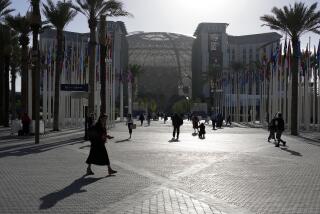Meet the Open Market Agnostics
- Share via
When Stanley Fischer, the first deputy managing director of the International Monetary Fund, addressed the annual retreat of the Pacific Council on International Policy this past weekend, he acknowledged that the current frightening global financial crisis was not exactly the best sales pitch for unfettered capitalism, but he then proceeded as if economic globalization and market opening remained foregone conclusions. Far from all in the audience, comparing the grim realities in Asia with the rosiness of open-market theory, were buying.
Fischer was hardly unaware that many tens of millions of people have lost their jobs and even their homes in the current turmoil, or that large chunks of the middle class in Asia (not to mention Russia and now, scarily, Brazil) have had their sense of ownership of their political system uprooted. But Fischer, in his quiet manner, remained the teacher telling the students: If only they were to study harder and be more patient, they would come to accept that the current course of one-world capitalism is clearly the right one. That perspective is not only quaint but, if you don’t mind, a primarily East Coast view. Surveying the global wreckage, many of the retreat participants, an establishment group largely drawn from California but also from Asia and Latin America, simply were not buying all of the IMF line.
Whether they realize it or not, the Pacific Council’s members (leading academic, business, political and media figures) are part of a larger private-sector phenomenon known as nongovernmental organizations. The definition of an NGO is vague, but it encompasses voluntary groups and associations that claim to work for the better good. There are untold thousands of NGOs in America, from Amnesty International to chambers of commerce, and many active ones in California. Writes the Carnegie Endowment’s P.J. Simmons, in the current issue of the journal Foreign Policy (“Learning to Live with NGOs”): “In general terms, NGOs affect national governments, multilateral institutions and multinational corporations in four ways: setting agendas, negotiating outcomes, conferring legitimacy, and implementing solutions. . . . Over time, this messy process of give-and-take [with governmental institutions] promises to transform the way that international affairs are conducted.”
That would be just fine by the Pacific Council. This relatively new NGO is a nonprofit policy group and sister organization to the East Coast’s Council on Foreign Policy. Based at USC, it seeks to have a positive effect on the nation’s foreign policy agenda, but rarely takes major public positions. It’s an establishment group that’s willing to buck establishment conventions.
At the three-day conference, the controversial issues of economic globalization and market liberalization, yesterday’s untouchable twin gods, actually got worse reviews than Bill Clinton, though the council took no official, formal position on globalization. To be sure, nationalist demagoguery of the kind preferred by Malaysia’s Mahathir Mohamad is not the only way to critique what hedge fund guru George Soros has astutely termed “free market fundamentalism.” Recall that in his testimony before Congress last month, Soros, whose global trading strategies were blamed by some for hastening the Asian market meltdown, said plainly that the world’s financial systems cannot go on without serious structural reform. He knows that people in developing countries, struggling to climb up the economic ladder, can be victimized when outsiders suddenly withdraw their money in massive amounts and leave behind the masses to starve. That critical perspective was endorsed by serious conference thinkers from Mexico to China. Of course, China’s leaders over the years stubbornly resisted Western calls to drop all restrictions on the trading of its currency. They’re not exactly sorry now.
While no one at the Pacific Council was proposing to don Malaysian garb and roll up the globalization sidewalks, there was certainly an emphatic assertion that this brave new world has major kinks to be ironed out.
Those advocating a temporary time-out from globalization are not necessarily all closet Mahathirs. After all, if the IMF and other established U.S. and world institutions had not reacted so slowly and rigidly when the first signs of trouble surfaced more than a year ago in Asia, today’s worldwide pain might not now be so widespread and intense. One conference attendee noted, accurately, that “the West’s belated response to the tragedy caused so many lives to suffer.” Others felt America was not listening attentively enough to the world. Said one former top non-U.S. official, “The world likes America’s leadership, but it likes it best when you listen. You can be a leader only by using the best ideas from other people. You in America can learn something, too.” When they challenge received wisdoms, private institutions like the Pacific Council can help the U.S. government climb that steep learning curve, as well as avoid driving off the cliff. After all, as Carnegie’s Simmons put it about NGOs, “On balance, their record is surely no worse than that of governments.”
More to Read
Sign up for Essential California
The most important California stories and recommendations in your inbox every morning.
You may occasionally receive promotional content from the Los Angeles Times.













